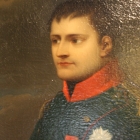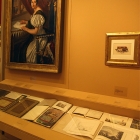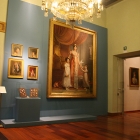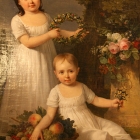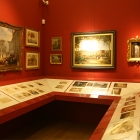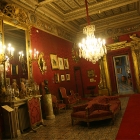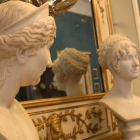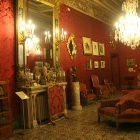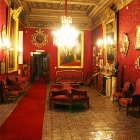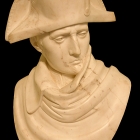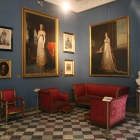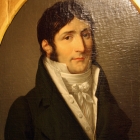Napoleon Bonaparte, between genius and mass murderer
For some, Napoleon is one of the most brilliant men that ever lived, a legislator that was ahead of his time and an audacious conquerer. For others, the Corsican was just a ruthless tyrant, whose obsession with war and power has cost the lives of 6 millions. Not only the French honor Bonaparte. A museum dedicated to him can be found in Rome. Italy was the first major conquest for Napoleon, who has always had Cesar and Rome as a model for his empire, that was to make France the dominant nation of his time. The exhibits are collected by Giuseppe Primoli, a local admirer of Napoleon who gathered all sorts of paintings, drawings, clothes, books and furniture pieces that are connected to the life of Bonaparte and of his family.
When Napoleon Bonaparte was born on the Mediterranean island of Corsica, on the throne of France sat the successor of Louis XIV, the Sun King. No one could predict that in a twist of destiny, France would see the first European king beheaded by the French Revolution, and that the young Corsican would crown himself as emperor of the country that occupied his little Italian island.
But the events triggered by the French Revolution took an unpredictable turn. After a period of high hopes, uncertainty and terror, the French restored the monarchy in an absolutist form through Napoleon, though he always claimed to be the embodiment of the Revolution.
Napoleon was no stranger to the period that had followed the Revolution. As a young officer, he repressed a rebellion of the people, being the first commander to use canons against Parisians. This massacre at 26 years old helped his career and brought him important assignments, such as conquering Italy or Egypt.
To Italians, Napoleon presented himself as a liberator, an ambassador of the Revolution, bringing progressive laws. Though he now has a museum in Rome, he didn’t try to conquer the Papal city fearing a popular reaction. He was to come back to Italy a few years later, after a spectacular crossing of the Alps, never attempted since Hannibal’s crossing using elephants during the Roman Empire.
After Italy, he turned to Middle East, in an attempt to attack British colonies and interest in the region. The results were rather scientific and propagandistic than geopolitical. An army of scholars traveled accompanied Napoleon, leading to the deciphering of hieroglyphs and better understanding of wildlife, as well as the development of archeology and other sciences. Bonaparte has made a habit of looting works of art and relics from Egypt, Italy and other places he conquered, exhibits that can still be found in places like the Louvre, which was established as a museum by Napoleon.
Besides a military genius, Napoleon was a propaganda master, who skilfully created his myth and even took care of his posterity. He started editing apologetic newspapers when he was a simply army man. Even the famous quote “A picture’s worth a thousand words” is attributed to him, as he commissioned paintings depicting him and his battles. And when reality didn’t serve him was not ashamed to lie. In the Middle East, Napoleon failed to conquer the fortress of Acre, but wrote home that the place was utterly destroyed. He ordered the wounded and those suffering of plague to be poisoned, and than he abandoned his Egypt army altogether to flee to Paris to seize political power.
By plotting and step by step maneuvers, he gained dictatorial power over France. Despite his lust for power, his reforms gained him the support and admiration of important personalities, including in the countries France was at war: Ludwig van Beethoven, GF Hegel, Heine. The Civil Code, which he supervised, is still among the fundamental laws in France today, with minor modifications, inspiring modern legislation in most of the Western World. Napoleon also brought progress in state organization, public education, city systematization.
Napoleon crowned himself emperor of France, in a ceremony conducted by the Pope in Notre Dame de Paris. This was yet another illustration of his PR brilliance as well as of his cynical view upon religion as only a tool for controlling people in the hands of politicians. Much later, Napoleon even abducted the Pope, seizing territories of the Vatican. Other important clergymen were imprisoned during his reign for various reasons, among which the absence from Emperor’s wedding.
Bonaparte took further his dream of imitating Cesar and Charlemagne through an European empire after crushing Austria and Prussia and agreeing with Russia a blockade against Britain. At this point, France, which had a demographic superiority over its neighbors became the undisputed master of the continental Europe. But rest was never an option for the impetuous conquerer.
In his last days, Napoleon regarded the campaigns that followed, in Spain in Portugal, as his biggest mistake, as a long guerrilla was took a very heavy price on his forces. But historians point to the subsequent Russian campaign as the most important strategic mistake he made. Though French troops took an abandoned Moscow, burnt previously by the Russians, Napoleon was forced to withdraw. The most of his army was lost in the Russian winter, harassed by local smaller armies. As in the deserts of Palestine, Napoleon left his troops in the icy snow, again fleeing to Paris for political reasons. This time, a blunt lie about a success in Russia was not an option. He had lost 90% of his 400.000 men army.
Bonaparte abdicated twice his throne, each time being exiled on an island. Napoleon tried to commit suicide, but the poison he took failed. He recovered his spirit shortly and acted as a real governor for the small island of Elba. He managed to escape the island Elba in less than a year, and the soldiers sent to arrest him started cheering for him. Despite this glorious return, Napoleon’s comeback was short and ended with the famous Waterloo defeat.
Napoleon Bonaparte was married twice, with Josephine and with Marie Louise, but also had several affairs. He divorced Josephine just because she was unable to produce an offspring, and he chose Marie Louise, a representative of the royal family of Austria, the Habsburgs, for political reasons. Yet his alliance with one of the most famous royal families of Europe did not prevent him from engaging in battle with Austria when his interests called it. The most important woman who refused the glorious general was the sister of the Russian Tsar, with whom he he wanted an arranged wedding before marrying Marie Louise.
His son, Napoleon II, became emperor only for a very short period. Napoleon tried to create his own dynasty, by crowning several members of his family in different regions, but was hardly successful. He had a deep affection for his mother, which had raised 8 surviving children, after being pregnant no less than 14 times.
Napoleon spent his last years on Island Saint Helena writing his memoirs and giving interviews that helped building his overwhelming personal image. He was above all a man of spirit, one of the most profound and witty quotes being attributed to him.
The founder of Museo Napoleonico in Rome, Count Giuseppe Primoli, was himself a descendant of Napoleon’s brother, Lucien. Everything that he gathered about the stay in Rome of the numerous Bonaparte family he eventually donated to the municipality.
Mai multe despre: Italia • biography • Corsica • France • history • Italia • Italy • Josephine • Museum • Napoleon Bonaparte • Roma- Home Page
start page - Architecture
landmark buildings - Sacred architecture
places of worship - Nature
landscape photography - Concert
performing artists - Christmas
Santa Claus pictures
- Jooble
jobs for photographers - Escape
an out of control blog - Merry Christmas
The best organizer of Christmas parties - Astro photo
Eclipse hunting and astrological photography

